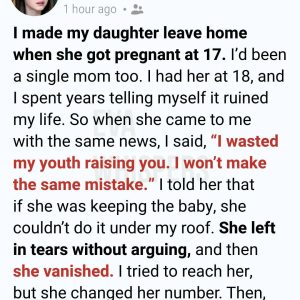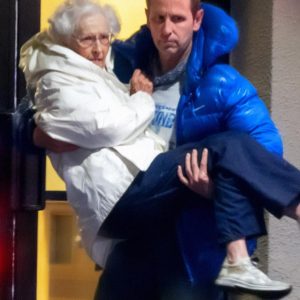Sam, the owner of the pawn shop, appeared weathered and enigmatic, carefully examining the watch as though it held a deeper story. When he quoted a price, I accepted it, even as a part of me felt broken by the act. His words lingered long after: “You’re wasting your life.” Those six words cut sharply, and I left the shop crying in the car, unsure whether to resent him or fear that his observation contained truth. At that moment, I confronted the harsh intersection of survival, responsibility, and the sacrifices required of young parenthood.
Years passed, and I devoted myself to building a life for Elijah and me. I completed my education, worked tirelessly, and nurtured my son into a kind and resilient young man. Despite the progress, the absence of the watch left an unhealed ache in my heart, a quiet void that symbolized the sacrifices we make in times of need. It became a subtle reminder of both loss and the longing for connection to my father, who had always been a guiding presence in memory if not in reality.
One evening, Sam appeared at my doorstep, carrying a wooden box and an envelope inscribed in my father’s handwriting. The letter conveyed affection, memories, and a revelation: my father had prepared a gift for a time when it would matter most. Inside the box were property deeds for a small cabin he had purchased and restored in secret, photographs reflecting the life he envisioned for us, and, finally, the watch itself. Sam explained that he had never sold the watch but had safeguarded it for the moment my father foresaw. The emotional reunion was overwhelming, with Elijah embracing me as we shared tears of relief, gratitude, and recognition of foresight and loyalty.
The gift provided more than material comfort; it offered a new purpose. Together, we restored the cabin and transformed it into The Watch House, a retreat dedicated to supporting young single mothers. The project became a tangible way to honor both my father’s legacy and Sam’s steadfast integrity. Their combined foresight and care ensured that what was lost was returned in a form greater than the original possession—an enduring symbol of hope, guidance, and communal support for those facing similar struggles.
Today, I wear the watch not as a mere instrument for telling time, but as a reminder of resilience, love, and the unexpected ways life restores what has been lost. It symbolizes the continuity between sacrifice and reward, memory and presence, and loss and restoration. Through the journey from desperation to fulfillment, the watch has become a testament to enduring love, loyalty, and the idea that even in our darkest moments, the efforts of those who care and the foresight of loved ones can guide us toward unexpected blessings, transforming hardship into purpose and connection.





